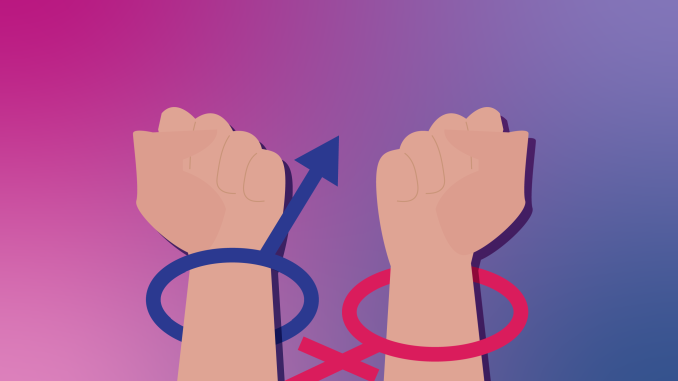
I knew part of my college experience would be finding myself in a different environment — once I moved into my dorm, I expected to change, but I had to overcome the nerves that came with moving into a new place with people I didn’t know. Still, the process would help me step out of my comfort zone and I was excited to try new things.
I grew up in a traditional nuclear family with my two parents and little brother. My parents were hardworking, and because of them, I was able to attend a private Catholic school from kindergarten through 12th grade.
I hadn’t realized until the first semester of my freshman year how much growing up in a religious environment influenced my perception of women and how I viewed myself as a woman. Taking my first steps towards becoming more comfortable with my authentic self included a lot of fear, but stepping out of my comfort zone was the key to maturing and developing as a person.
In Catholic school, I learned about vocations — spiritual callings to a certain path in life. The vocational options for women were to marry a man and have children, join a convent and become a nun or stay single and celibate for the rest of your life.
I believed everything my teacher said was true. Although getting married to a man and having children didn’t appeal to me, I didn’t want to remain single and certainly didn’t want to join a convent.
I also learned anything other than being heterosexual was wrong. Gay people were sinners and unnatural, and women were supposed to only like men, as God intended.
When I was around 13, I realized I was queer, and this only added to my fear of not belonging. I knew little of what being queer meant — I was only told it was unnatural and God would be angry with me.
I didn’t want to go into high school being different. I knew how ruthless kids could be with homophobia, and I didn’t want to be on the receiving end of that. I just wanted to be a normal girl, like the ones I saw on TV who were anything but gay.
I entered my freshman year of high school as a feminine girl who wore dresses and skirts, regularly doing my makeup, nails and hair. I was “happy,” but underneath it all I knew it was fake.
I watched girls who weren’t as feminine get teased for their looks. They were sometimes called homophobic slurs.
During my sophomore year of high school, three girls I was close with came out as bisexual and gay. Through our friendships, I came to terms with my own queerness, and I felt safe to be myself because I knew they understood what I was going through.
I don’t remember how, but people found out about my three friends coming out and everyone was talking about them — either making crude jokes or saying how uncomfortable they felt around them.
Whenever things like this happened, I shamefully disappeared into the background, hoping I wouldn’t be targeted next.
I stuck by my friends who came out because their experiences were similar to mine. They helped me understand what being a non-straight woman meant and made me feel seen for the first time in my life.
I enjoyed being feminine by caring and nurturing, but I had a masculine personality because I’m strong-willed, confident and assertive. I sought things that appealed to my sexuality and gender, discovering sub-cultures on social media where I found people just like me like everyday people and celebrities.
Temple University was one of those places that appealed to both identities. It was in the middle of a city where diversity was the main selling point, and I could find people like myself.
I also saw how vocal Temple was in supporting marginalized groups within its student body, specifically how my school — the Klein College of Media and Communication — publicly supported LGBTQ+ students, and the university’s vocal support of the Black Lives Matter movement in the summer of 2020.
My roommate, Madison, opened my eyes to what life could be like, she would always be herself without fear of what others thought about her. Madison’s confidence in herself motivated me to become more self-confident.
I began to let my feminine facade wash away. I wore more neutral clothing that didn’t give much of a physical shape.
In high school, I felt like I was stuck back in the closet whenever I dressed on the feminine side. But my roommates showed me I could be masculine and a woman and that being one didn’t negate the other.
Through my first semester in college, I learned the experience of womanhood is not something set in stone, but rather a sturdy foundation to build on with experiences.
Femininity and masculinity can exist on a spectrum, with things like sexuality and race being factors into how they are expressed. When I started being myself, I realized the world didn’t end like I thought it would and I became a much happier person.



Be the first to comment